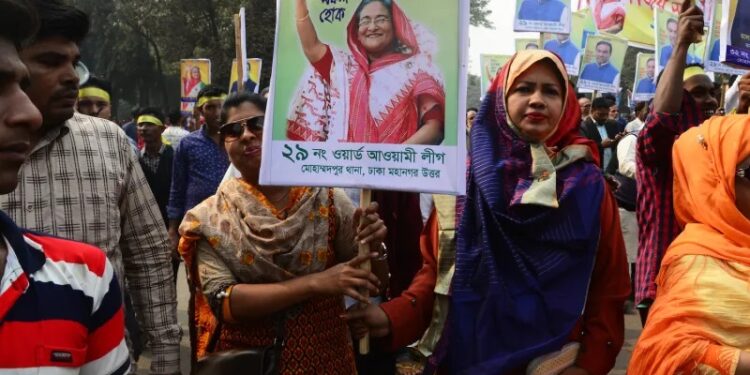In 2018, New Delhi viewed Bangladesh’s main opposition party as ‘anti-India’ but today it is willing to talk to more acceptable sections within the same political formation.

Representational image of an election campaign in Bangladesh. (Photo: foreignpolicy.com)
As Bangladesh prepares to vote again — most likely in January 2024 — the BNP’s tail is up and for more reasons than one. First, the Indian establishment is today prepared to listen to the BNP. In March this year, a three-member delegation of senior BNP leaders paid a quiet visit to Delhi and met key Indian functionaries who play a decisive role in Bangladeshi affairs. This was followed by other meetings between Indian officials and BNP leaders in Dhaka.
But in the last week of August, the meetings between Indian officials and BNP leaders, in a third country (Singapore), has been more substantive. Although the BNP leaders, including Mirza Fakhrul Islam Alamgir and Mirza Abbas, were in Singapore, supposedly for “health-related check-ups”, they took time out to meet with some Indian interlocutors. Both sides parted on an optimistic note and without closing the doors to future confabulations. Alamgir flew back to Dhaka on September 2, while Abbas is expected to prolong his stay there. A third senior BNP leader, Khandaker Mosharraf Hossain, who was in genuine need of medical attention, also remained behind in Singapore.
The key take away of the Singapore pow-wow was whether a relatively “pro-India” segment within the BNP might not be averse to be part of a broad national coalition that could be an alternative to an increasingly independent and China-leaning section of the Sheikh Hasina-led Awami League. Both the Indian interlocutors and the BNP will have to weigh the degree to which pro-Indian segments within the two main parties will be able to work together to forge a common political platform, if at all they agree to work together towards this goal.
Speaking to the Northeast News, one of Bangladesh’s foremost political analysts, Badiul Alam Majumdar, who is also the country director for the US-based The Hunger Project charity, said, “It is for Bangladesh’s political parties to ultimately decide and work towards a comprehensive and sustainable solution to the years of political uncertainty and instability in the country. Only their sagacity, wisdom and courage of conviction to achieve such a solution will ensure political and economic stability in the future”.
Majumdar sees three present scenarios in Bangladesh: a “one-sided election” held within the framework of the current constitution; a competitive, free and fair electoral process; and deferred polls. “I am no fortune-teller but what we are witnessing today in Bangladesh is seemingly irreconcilable political differences that can lead the country towards deeper uncertainty”.
On their part, the Indian establishment has been watching with exasperation the widening chasm between themselves and Sheikh Hasina and her relentless move to embrace China, at least economically, and Beijing’s no-holds-barred drive to court her. While it is no secret that the Indian foreign relations and security establishments are deeply concerned over a likely fall of New Delhi’s last bastion of hope (Bangladesh) to China’s seemingly aggressive pursuit of Sheikh Hasina, they are equally hopeful of engaging with Awami Leaguers who continue to believe in and rely on their “pro-Liberation” political spirit and ethos.
“The Indians are processing politics in Bangladesh a little differently this time and winds of change are obvious in Delhi’s portals of power. The Indians are learning the pitfalls of putting all their eggs in one basket,” a top BNP leader said, adding quite gleefully that senior officials in New Delhi “are now taking serious note of the concerns being expressed by the US and the rest of the Western bloc”. The BNP is so upbeat this time around that it is openly citing — pejoratively, of course — the number of days some key Awami League ministers have actually attended office in the last nine months: nine days by Finance Minister Mustafa ‘Lotus’ Kamal and 81 days by Health Minister Zahid Maleque.
The BNP’s assessment is that while the regional and big powers continue to mount pressure on the Awami League, especially to keep Beijing at bay, Bangladesh’s failing economy has cast a shadow on the people who are now more pessimistic about their well-being than ever before. Citing an August 2023 report on Bangladesh by the International Republican Institute (IRI), the United States Institute of Peace recently said that “Bangladeshis are pessimistic about the economy, politics and overall state of the country”. The IRI report concluded that 51 percent of respondents in a countrywide survey “said the economy is doing poorly — up 35 percent since 2019”.
Rattling off numbers that reflected an impending economic doom in Bangladesh, the BNP leader cited above said, “Imports are down by 35 percent and this could go up to 40 percent and remittances have taken a hit. Different key sectors of the economy (energy and airlines) are in a state of paralysis. Foreign reserves have hit rock bottom. Bangladesh has nearly gone bust. The people are no longer feeling the pinch; they are grievously hurt”.
Faced with this crippling economic reversal, the incumbent Awami League government seeks to build on its image of a relentless pro-development and pro-infrastructure force. However, in the midst of the economic gloom, the rise in the BNP’s popularity and growing pressure from India and the West, many Awami Leaguers are veering around the possibility of a “broad political front” reminiscent of the successes of a combined opposition in the early 1990s. Much depends on how India and the West forge their efforts to check the Chinese penetration. More importantly, all eyes — and certainly that of the BNP and other opposition parties — on how adroitly New Delhi manoeuvres politically to bring together seemingly disparate forces that will be capable enough to stand up to Sheikh Hasina’s Awami League electorally.
(The writer is a Delhi-based senior journalist)










